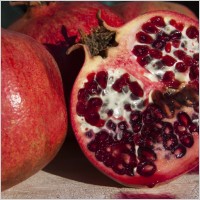Pomegranate Health Benefits For Wellness
A Bit Of Its History
Pomegranate and its color have been one of the most admired fruits that is know for its strong properties such as antioxidant, carbohydrates, rich in vitamins C, E, and B6. It also contains a significant amount of B1, B2, and niacin.
There is no Beta carotene in the fruit, (which is pro vitamin A). It contains the following minerals in great quantities; copper, iron, potassium.
It is noted that "this fruit has been the object of great fascination particularly in Oriental cultures and is described as the tiny beads of fruits, full of precious juice, are brilliant as drops of blood or rubies."
From a spiritual perspective, quoted by Solomon the wise man who made a comparison of the "cheeks of his beloved to the three thousands years ago."
This exotic fruit with its scarlet blossoms is originated from the Near East, and from that point it dispersed throughout the Mediterranean. It can be found in Countries such as Iran where it is grown in great quantities, Turkey, Mediterranean countries, also on the American continent including Brazil and California.
How To Prepare And Use The Pomegranate
- The Natural Aspect Of The Fruit
In comparison with other fruits, it is noted to be among the most easily stored fruits after it is harvested. After it is picked from the tree it is ripens very well and said to have little or no effect on its nutritive values and properties. It can last for a long period of up to six months if stored in a cool dry place.
The juice is very flavorful and refreshing. Extracting is very simple and easy by using a juicer or nutrition Juice extractor such as the Nutri-Bullet that is know for its unique features and characteristic of pulverizing and breaking the walls of fruits and vegetables.
- Its Grenadine Syrup
You can make your own home made syrup grenadine syrup by cooking the pomegranate juice with sugar. This syrup can be stored for many months and can be used as a beverage, when by diluting it with water, or to even use it to flavor your fruit salads.
Undesired Anti-Parasitic Effect
If by any means the anti-parasitic effect has become undesired, you should remove the "internal Membranes" that separate the sacs based on the fact that it gets very bitter.
Some Non-Nutritive Components Benefits
 Pomegranate
PomegranateThere are some components of the fruit that are non-nutritive but contain very high health benefits and values.
Citric acid plus other organic acids give the fruit a pleasant bitter-sweet taste, and also contribute to its beneficial effect on the intestine, also contributes to the restoration of the intestinal bacterial flora.
- Tannins
Tannins are produced in small amounts and are found in the "Rind" of the fruit and also in the membranes that separates the seed sacs. The Tannins are said to have an "astringent and anti-inflammatory on the mucosa of the digestive tract."
- Anthocyanins
The vegetable pigments with its reddish and bluish colors are of the Flavonoid Group and they act as antiseptic and anti-inflammatory substances in the digestive tract, they are also very potent antioxidants inside the cells. These substances also slow down or stop the aging process and any cancerous degeneration.
Properties of The Pomegranate
With the combination of the components mentioned above such as the; Citric Acid, Tannins, and Anthocyanins attribute the following properties to the pomegranate: Astringent, Anti-inflammatory, Vermifuge, Remineralizer, Alkalizer, and depurant.
These properties make the Fruit very effective and useful in the following areas:
It helps to reduce the production of gastric juice and also reduces inflammation when the stomach is irritated. This process takes place because of its astringent action.
- Metabolic Disorders
In the case of a gout, excess uric acid, and obesity, the pomegranates are of very high value. This is because of its alkalizing and depurant effect.
- Hypertension
It is very rich in potassium and as a result of the absence of sodium, those who suffer from hypertension can benefit greatly from it. Both numbers of systolic and diastolic pressure are avoided with the help of this fruit.
- Iron Deficiency Anemia
A Significant of of copper - 70 ug/100 g - it is referred to as a trace element that facilitates the absorption of iron.
Nutrients And Phytochemicals
The seeds of pomegranate contains 12% of the Daily Value of Vitamin C, and 16% of the daily value of Vitamin K for every 100g of serving. It contains polyphenols namely; flavonoids and ellagitallins.
The seeds are a good source of dietary fiber and is found in the edible seeds. If you throw out the seeds, you will be you will be discarding the nutritional health benefits that is contained in the seeds fiber and micro-nutrients.
It is also an excellent source of antioxidant that eradicates and blocks free radicals, and expels toxins from the body.
Pomegranate Composition
Per 100g of Raw edible portion
|
Energy | | | | 1% 2% 4% 10% % Daily Value (based on a 2000 |
68.0 kcal - 283k g | | | 20% 40% 100% calories diet) |
Thank You For Reading!
Do You Like What You Just Read?
It is my intention to spread the good news far and wide about " Health Nutrition for wellness " If you really like what you just read, then please join me in my effort to inform and educate the world. Your social media of choice proves the option to do so. You can also ask others to help spread the word.
By Using An Extractor You Will Discover:
1. The Power of Cellular Health Nutrition for wellness is the Life-Line to Optimum Health.
2. How To Use Raw Fruits And Vegetables As Natural Healing Foods For Ultimate Health.
3. How to take control of your health using Natural Healing foods for health and wellness
A Man's Health is his greatest asset
Cellular Nutrition Is The Key To Optimal Health
A Nutrition Extractor Is The Key To Optimum Health
NutriBullet Pro
Stop throwing away your Fiber and Money In the Trash Can, and start using the Nutrition Extractor - The Nutri Bullet Now.
Recent Articles
-
Health Nutrition for Wellness, and Longevity
Jul 13, 25 12:17 PM
Health nutrition for wellness is achieved by, extracting nutrients and enzymes from raw fruits and vegetables. It nurtures the cells that store energy and oxygen -
Fruits and Vegetables Health Nutrition For Optimum wellness
Jun 14, 25 01:35 AM
Fruits and Vegetables are The Natural Source For Health Nutrition to enhance optumum health wellness and longevity -
Diet Recipes For Wellness Longevity And Optimum Health
Jun 12, 25 07:14 PM
Diet recipes for optimum health are carefully designed to help you get the most health benefit from your raw fruits and vegetables
Help Us Spread The Word!
Cellular Nutrition "For Optimum Health
Do not forget that cells determine our state of health, and are the building blocks of your body that store the energy needed to function. They are often neglected and rarely spoken of. Often times we hear of cancer cells and sickle cells etc. These are the very cells when attacked by these diseases create health hazards in our lives and that's the reason why we should take preemptive action and nurture them to keep them healthy. They must be specifically targeted with called cellular nutrition. Listen to Dr. Herber explains in a very timely manner the importance of cellular nutrition how it impacts your life in a favorable way, and how it can work for you.




